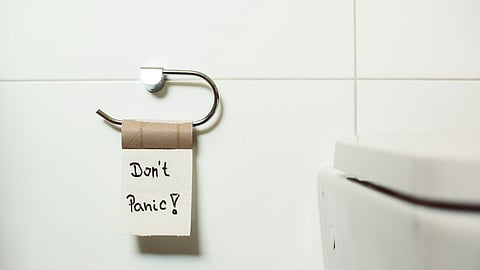Does Your Bowel Feel Shy in Public?
Gut health has gained significant attention in recent years, raising public awareness about maintaining a healthy diet and lifestyle. However, discussing defecation remains taboo in many cultures. This misconception has even led to conditions like Parcopresis (shy bowel syndrome), where individuals feel unable to defecate in public or unfamiliar settings.
When the brain says evacuate, the bowel says only at home.
Dr. Alpa Kumar., MBBS, MRCGP, DRCOG, IFMCP
Dr. Alpa Kumar, MBBS, MRCGP, DRCOG, IFMCP, a certified Lifestyle and Functional Medicine specialist, has taken steps to break this stigma. Through her Instagram post, she sheds light on shy bowel syndrome, its causes, symptoms, and treatment options.
What is Parcopresis?
Parcopresis, commonly known as shy bowel syndrome, is the inability to defecate in public places or outside the comfort of one’s home. While it might seem quirky, this condition is closely linked to anxiety and socio-cognitive factors.
In her Instagram reel caption, Dr. Kumar explained the reasons behind shy bowel syndrome, its symptoms, and evidence-based treatments to help individuals overcome it.
Why Does This Happen?
Social Anxiety: Fear of being overheard or judged in a public restroom.
Perceived Lack of Privacy: Public restrooms can trigger feelings of vulnerability.
Negative Past Experiences: Embarrassing or stressful situations related to using public facilities.
Hypervigilance: The brain perceives potential threats, causing the body to "freeze" and interrupt bowel movements.
Symptoms
Intense anxiety when attempting to use public restrooms (even in the presence of friends or family at home).
Physical inability to defecate, even with a strong urge.
Avoidance of long trips or outings where private bathrooms are unavailable.
Safety behaviors like reducing food intake or hydration.
Discomfort or prolonged holding, leading to constipation or abdominal pain. (1)
Dr. Kumar notes that shy bowel syndrome may be linked to past trauma, family history, or psychological disorders such as obsessive-compulsive disorder (OCD).
Investigations
Medical Assessment: To rule out physical conditions like constipation or irritable bowel syndrome (IBS).
Psychological Evaluation: To identify anxiety or phobia-related disorders.
Behavioral Analysis: To detect triggers and patterns related to bathroom-related anxiety.
Evidence-Based Treatments
Dr. Kumar recommends the following evidence-based treatments:
Cognitive Behavioral Therapy (CBT): Gradual exposure to public restrooms to reduce anxiety.
Relaxation Techniques: Breathing exercises and mindfulness to manage stress.
Pelvic Floor Therapy (PFPT): Exercises to strengthen or relax pelvic floor muscles and address improper bowel habits.
Dietary Adjustments: Incorporating high-fiber foods to ease constipation and reduce strain.
Medications: Anti-anxiety medications prescribed by a specialist, if necessary.
Through awareness and proper treatment, individuals with shy bowel syndrome can regain confidence and lead a more comfortable life.
Note: This content is purely informational and isn’t medical guidance. It shouldn’t replace professional medical counsel. Always consult your physician regarding treatment risks and benefits.
Reference:
1. Knowles, Simon R., and Jason Skues. 2016. “Development and Validation of the Shy Bladder and Bowel Scale (SBBS).” Cognitive Behaviour Therapy 45 (4): 324–38. https://doi.org/10.1080/16506073.2016.1178800. 20/01/2025
By. Dr. Jude Bencia


